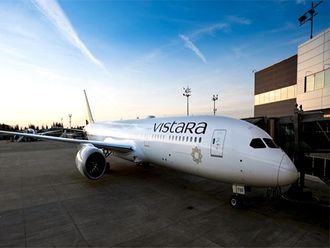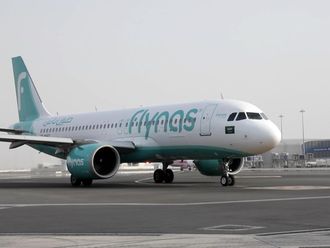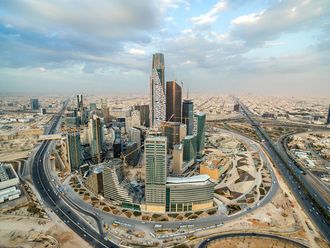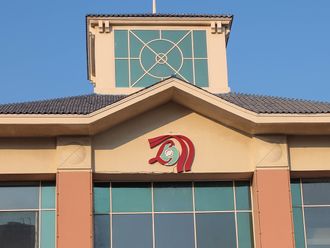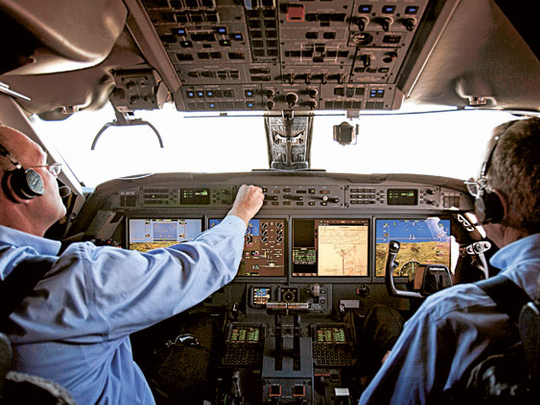
Dubai: At a time when the aviation industry is struggling to maintain its flight amid much turbulence, technology can come to the aid of airlines in the Middle East as well as those globally.
Phoenix, Arizona-based Honeywell Aerospace is a leader in providing advanced avionics and other systems for the aerospace industry.
In an exclusive interview with Gulf News, Paolo Carmassi, the Fortune 100 company's President for Europe, Middle East, Africa and India (EMEAI), discusses how crucial a role technology can play in helping carriers increase profitability.
Gulf News: What are some of the possible solutions that technology can offer the aviation industry in the Middle East in the wake of volatile fuel costs?
Paolo Carmassi: As fuel represents the single biggest cost to airlines, the soaring price of oil is adding tremendous pressure to reduce operating costs and increase overall fuel efficiency. This volatility in fuel price has already had a significant impact on the industry: In June this year the International Air Transport Association (IATA) forecast that Middle Eastern carriers will deliver profit of approximately Dh367 million in 2011, down from approximately Dh3.3 billion in 2010.
The aviation industry is exploring a combination of different technologies, which together deliver savings through reduced fuel consumption and improved operational efficiency.
One way airlines are reducing fuel costs is through more efficient routing with the help of advanced Flight Management Systems (FMS). Honeywell developed the first FMS in the 1970s. FMS help flight crews compute the most efficient flight profile and automatically navigate the aircraft.
Honeywell recently announced a partnership with French aerospace leader Safran to deliver an innovative new electric taxiing system for new and existing aircraft. This system is designed to significantly improve airline operational efficiency and provide environmental benefits by slashing carbon and other emissions created during taxi operations.
How much do you see biofuels helping in cost reduction for the aviation industry?
The adoption of alternative fuel sources, such as renewable plant-based biofuels, reduces the aviation industry's consumption of and dependence on petrol-based fuel. Biofuels are a replacement technology which airlines can use in combination with conventional fuel, with no need to replace or modify existing aircraft engines. Alternative fuel sources are valuable in an environment of volatility. By providing airlines with an additional resource for fuel, biofuels give carriers more options to help them cope with changing fuel prices. Biofuels also produce less carbon dioxide emissions and therefore are better for the environment.
For instance, a Honeywell Gulfstream G450 business jet recently used a 50/50 blend of conventional aviation fuel and its own Green Jet Fuel derived from renewable plant crops to drive one of its engines during the flight from Morristown, New Jersey, to Le Bourget airfield in France. The Green Jet Fuel saved approximately 5.5 metric tonnes of net carbon dioxide emissions compared to the same flight powered by petroleum-based fuel.
When used together, these technology solutions can deliver considerable cost-savings, operational efficiency and environmental benefits to airlines, and will play a significant role in the Middle East and worldwide aviation industry in the future.
With around 80 per cent of Middle Eastern airspace being restricted for military use, air traffic corridors are becoming more congested as regional air traffic continues to expand. How can technology help in this regard?
Middle Eastern airlines experienced a rise in revenue passenger kilometres (RPK) by 7.3 per cent between May 2010 and May 2011, according to IATA estimates.
The challenge for airports and airlines in the region, therefore, is how to manage this increased volume of air traffic within the same number of air routes and a finite available airspace. Subsequently, modernising ATM (air traffic management) systems has now become critical.
The modernisation of ATM is a strong focus for Honeywell both on a regional and global level. In Europe, Honeywell is one of the 15 companies to have joined the Single European Sky ATM Research Joint Undertaking (SESAR JU). The initiative focuses on developing a next-generation air traffic management system to increase efficiency, make flying more environmentally friendly and to reduce costs.
Similar industry initiatives are also underway in the US (NextGen), Asia-Pacific (ASPIRE) and China (CNAS), and each has the same objective — to improve operational efficiency. We are keen to be a part of a similar initiative in the Middle East.
How can technology help increase Gulf carriers' profitability over the next few years?
Technology plays a crucial role in increasing profitability. Gulf carriers can potentially reap significant benefits by embracing solutions that can firstly be easily retrofitted into existing fleets to extend lifecycles and maximise efficiency of current airframes, and secondly equip new and upcoming aircraft to enhance overall performance. Moreover, technology can also reduce maintenance expenditure by decreasing lifecycle costs for the considerable investments made in aircraft.
Technology also plays a significant role from a passenger perspective, by enhancing the flying experience and reducing the number of delays and flights cancelled, therefore increasing desirability for frequent air travel.
How significant a role does new technology play in the long-term reduction of costs for the aviation industry?
New technology can help manage the increase in traffic volume by improving the accuracy of an aircraft's situational awareness relative to other air traffic. These new technologies — such as Traffic Collision Avoidance System (TCAS) solution with SmartTraffic — maximise safety while reducing operating costs. The result is that a greater number of aircraft can fly accurately and efficiently in existing traffic lanes.
TCAS with SmartTraffic is designed to safely reduce the amount of spacing between two aircraft on medium and long distance flights.
With the system, pilots can choose a more efficient altitude during transoceanic flight routing and move to adopt that route more quickly than with traditional TCAS systems.
The ability to simply change routes can enable annual fuel savings of up to approximately Dh367,000 per aircraft, adding up to millions of dirhams across an average airline's operational fleet.
How can airlines leverage technology to improve their bottom line and/or revenue?
Technology plays a key role in helping airlines improve their bottom line as new developments enable airlines to significantly increase performance and reduce costs through decreased fuel consumption and safer, more efficient systems and processes.
One way airlines can leverage technology on their existing fleet is by retrofitting aircraft with the most up-to-date equipment.
Technological advancements in auxiliary power units (APUs), the backup generator on aircraft that are used to provide power and start the main engines, have allowed for greater fuel efficiency and reduced emissions resulting in real cost savings for airlines. In addition, longer hours between unscheduled repair events means on-aircraft maintenance costs are significantly less than earlier APU models.
Research from IATA indicates that improvements in air traffic management alone could improve fuel efficiency by 10 to 12 per cent.
To put this in perspective, in Europe even a one per cent efficiency gain saves up to 500,000 tonnes of fuel per year.
Furthermore, improving air traffic control systems can reduce the aviation industry's dependence on oil by one per cent, saving 50 million barrels of oil and over 18 million tonnes of carbon dioxide emissions.
Career in aviation
After starting his Honeywell career in 1991 as a technical and sales engineer in Milan, Italy, Paolo Carmassi was named President of Honeywell Aerospace EMEAI in August 2006.
Of Italian origin, Carmassi is responsible for driving profitable growth across the company's commercial and the defence business segments, strengthening customer relationship, driving operational performance and establishing Honeywell Aerospace as a domestic player in the region.
Prior to joining Honeywell Aerospace division, Carmassi was Vice President and General Manager for Asia Pacific for Honeywell Transportation Systems division in Shanghai, encompassing its automotive portfolio Turbocharger Technologies, Consumer Product Group and Friction Materials.


